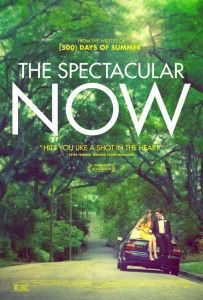
Movies are exalted for their ability to provide escapism to their viewers. Excursions into fantasy heal the past and romanticize the future, allowing audiences to escape the persistent imperfections of the here and the now.
As such, when a film crashes through the rose glass that tints most Hollywood lenses, the impact of reality feels, at first, harshly alarming, then humbly familiar and finally hugely inspirational.
So emerges The Spectacular Now, a visceral recitation of perhaps everyone’s own high school experience.
Told through the voice of hero Sutter (Miles Teller), The Spectacular Now follows the transformation of Sutter, king of spontaneity and of the party, as he meets the shy and sensitive Aimee (Shaliene Woodley) in their final year of high school.
In an interview with The Daily Free Press, actor Miles Teller and director James Ponsoldt described the naturalism that guided the script, performances, and cinematography of The Spectacular Now, explaining how each they feel that characteristic inherently flows through themselves. Void of the pretension that often clouds press tours, Teller and Ponsoldt spoke of their film’s origins frankly and responded to proposals that The Spectacular Now has saved modern romance in humble tenor.
“Something I thought a lot about was the difference between sentimentality and nostalgia,” Ponsoldt explained about his approach to The Spectacular Now.
Frustrated that many teen films capitalize on sentimentality to turn tears into ticket sales, Ponsoldt said he believes sentimental films do not accurately portray the true pain or anxiety of adolescence. In contrast, Ponsoldt said nostalgic films explore the “vast emotional spectrum.”
Teller agreed, explaining that he wanted The Spectacular Now to remind viewers “of what it was like to be 18, how amazing it was and how terrifying it was.”
The Spectacular Now is indeed emotionally complex. Not only does Sutter’s character struggle to embrace the past, present and future, but he also faces the emotional hurdles that many adolescents fight to scale: A disappointed teacher, an absent father and a bleak career.
Equally as complicated, Sutter and Aimee find immense happiness by embracing of the present — at the detriment of their futures.
The genius to The Spectacular Now is that it does not offer an easy-to-swallow remedy for all of Sutter’s, nor life’s, complexities.
“The goal was to not challenge the characters,” Ponsoldt said. “A lot of films offer easy, readymade slogans that the audience can take away … but don’t resemble real life.”
Because fairytale endings provide comfort to the masses and therefore have higher ticket sales, films that portray the complexity of reality are scarce. Despite our adolescent hopes, neither Mr. Darcy from Pride of Prejudice nor the Avengers will ever actually save the day. Ordinary human beings will. And through the proliferation of films like The Spectacular Now, the common man can find empowerment in seizing the now and affecting change for the better.
“A lot of studios have moved to a place where they’re only interested in blockbusters,” Ponsoldt said. “Maybe somewhere along the line, [studios] stopped respecting the intelligence of audiences, but I respect audiences enormously.”
With such regard for his viewers, evident in both the authenticity of his interview and in his filmmaking, the film community can only hope for more Ponsoldt films in the future.
“James Ponsoldt was a big inspiration for me,” Teller said, when asked about his preparation for The Spectacular Now.
Both Ponsoldt – and The Spectacular Now – can be big inspirations for us all.
This is an account occasionally used by the Daily Free Press editors to post archived posts from previous iterations of the site or otherwise for special circumstance publications. See authorship info on the byline at the top of the page.



